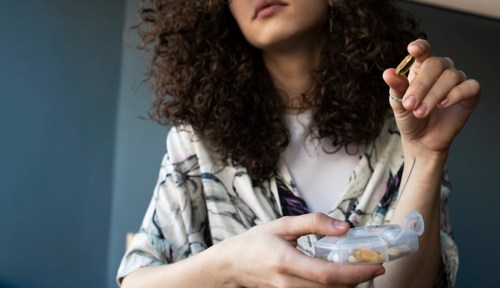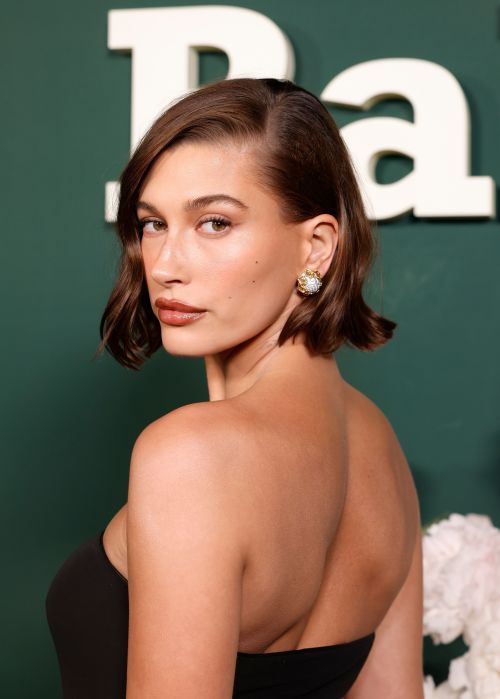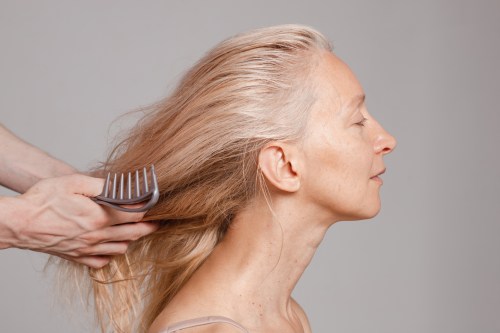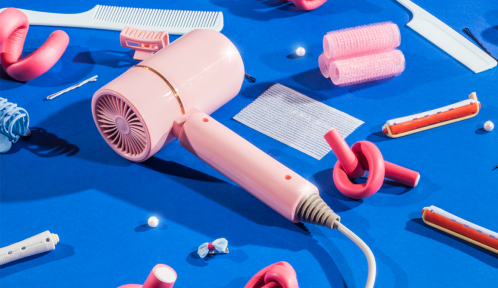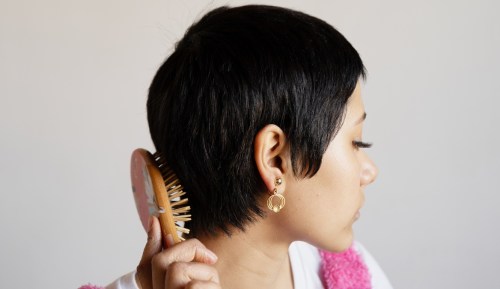Topical minoxidil—the active ingredient in rogaine—is one of the most effective treatments for male or female pattern baldness (which is also known as androgenic hair loss). It works by shortening the hair’s “rest” phase and pushes it into the “growth” phase, which slows shedding. But unfortunately, minoxidil-based hair-growth treatments are often messy. Foam formulas are sticky and can leave your hair feeling crunchy, and liquid solutions are oily and can make your hair look greasy. Plus, you need to apply it twice a day to get the best results. But now, there’s an alternative, as more and more doctors are starting to prescribe an oral version of minoxidil.
Experts in This Article
board-certified dermatologist
Los Angeles-based internal medicine physician
board-certified hair restoration physician and plastic surgeon
“Oral minoxidil’s not so new,” says board-certified hair restoration physician and plastic surgeon Michael Wolfeld, MD. “The topical version of it, which we know by the brand name, Rogaine, is a proven treatment for hair loss. Oral minoxidil is not technically FDA-approved for hair loss, it’s really given as an antihypertensive, or blood pressure medication. But they found that one of the side effects of using it for blood pressure was increased hair growth.”
Oral minoxidil is gaining popularity alongside the rise of other oral hair-growth treatments. Prior to this summer, the only FDA-approved oral option was Propecia, a drug that only men can use due to its hormonal interactions. However, in June, the FDA approved the first drug for the treatment of alopecia areata (an autoimmune disorder in which the body attacks its own hair follicles) from Eli Lilly. Pfizer just submitted an application for FDA approval for a similar drug, and Concert Pharmaceuticals is in the process of doing the same. Having oral hair-growth drugs makes the process easier to adhere to, and thus, more effective.
“It’s much easier for people to take a pill daily than it is to deal with putting a solution or a foam on their scalp twice a day, which is greasy, it can be irritating, you have to remember to do it the right way,” says Dr. Wolfeld. “So taking the pill, just from a compliance standpoint, is much easier. So I think that that’s what’s very attractive to patients is that it can be effective, but it’s also just easier to take.”
But like topical minoxidil, it is a long-term commitment. It can take a few months to see results and you have to keep taking it in order to retain the growth. Once you stop, you will, over time, lose any new hair you grew while taking oral minoxidil.
What happens when you take oral minoxidil
When oral minoxidil is taken for hair loss, it’s prescribed at much lower doses than when it’s intended for blood pressure management. However, you still need to be cautious about the hypotensive effect it can have. “Blood pressure is something that I routinely check now for anyone that I do start on minoxidil, and that’s not usually common with a dermatology practice,” she says.
Dr. Lee notes that oral minoxidil can also cause a bit of swelling during the first week or two of starting it.
“Some people get a little bit of temporary swelling with the minoxidil and usually around the ankle area, and that’s fluid retention,” she says. “But overall, it’s pretty well tolerated. And I think that’s the wonderful thing about minoxidil.”
Since the medication is systemic, meaning it affects your entire body, there is a chance that you may see increased hair growth in areas other than your head, explains Jessica Cho, MD, an integrative medicine doctor and hair restoration specialist.
“Low-dose minoxidil can cause hair growth known as hirsutism in other areas like the face and arms,” says Dr. Cho. But according to a 2021 study that examined the side effects of low-dose oral minoxidil for hair growth in 1,404 people, the chance is pretty low. Unwanted hair growth was seen in about 15 percent of participants, and only one percent of patients withdrew as a result.
Anecdotally, Dr. Lee has seen more patients experience unwanted hair growth with topical minoxidil rather than oral.
“Even with the minoxidil foam or the solution, I have folks who get so excited. They’re like, ‘I’m just going to put a lot on,’ and then you see all of a sudden women sprouting sideburns that they don’t want to sprout,” she says. “With the oral medications, I have not seen that so far. It’s possible because you’re stimulating that hair growth everywhere and it’s really focused on the terminal hair growth, but I’ve not seen it yet in clinic.”
Does taking oral minoxidil mean you stop using the topical solution?
When you talk with your doctor about starting oral minoxidil for hair growth, they’ll guide you to whether you should use it along with the topical solutions or on its own. Dr. Cho is a huge fan of combining them to get the best results, depending on the patient.
“You can actually use them as a complementing pair,” says Dr. Cho. “The topical will still work, but I think oral medicine will definitely enhance.”
However, Dr. Lee doesn’t usually combine the two because she finds it difficult for patients to adhere to the extra step.
“Often it just depends. I don’t want to overcomplicate things,” says Dr. Lee. “I have some patients who have tried the minoxidil foam or the solution. And they’re like, ‘Ew, I do not like how it makes my hair feel. It feels greasy or it feels like there’s a residue.’ And I say, ‘Let’s just focus all our energy on the oral.'”
If you’re experiencing hair loss and looking for an easy daily solution, oral minoxidil might be a perfect fit. Have a chat with your doctor and see what your options are.
Sign Up for Our Daily Newsletter
Get all the latest in wellness, trends, food, fitness, beauty, and more delivered right to your inbox.
Got it, you've been added to our email list.
